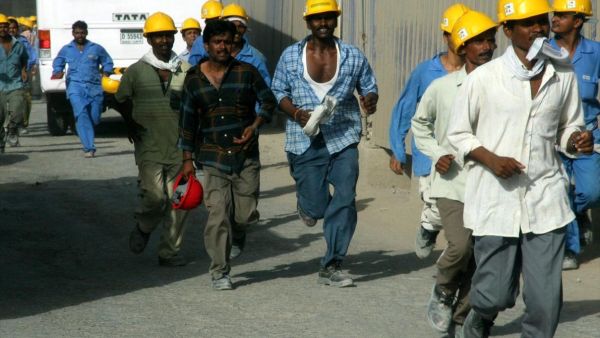- A Human Rights Watch report has found that migrant laborers are dying on Qatari construction sites amid concerns over workers' rights
- The NGO has also criticized government investigations into migrant worker deaths in the country
- Migrant workers are often lured to Qatar on false promises and arrive to find themselves facing large recruitment fees and low wages
- The government promised to improve working conditions but NGOs claim that little has changed on the ground
Migrant workers in Qatar are still dying due to poor working conditions despite pledges by the country’s rulers to improve their lives.
Last week a report by international NGO Human Rights Watch found that the workers, who often come from southern Asia, were being forced to work in extreme heat and potentially fatal conditions.
Currently, regulations only set limits on outdoor work from 11:30 am to 3 pm during the period Jun. 15 to Aug. 31.
However, the group says that potentially lethal weather conditions often occur outside of these hours.
The report suggested that the high temperatures during certain work hours can lead to “potentially fatal heat-related illnesses in the absence of appropriate rest."
Meanwhile, the NGO also urged the Qatar’s rulers to probe the causes of a string of migrant worker deaths that occurred in the country.
“Enforcing appropriate restrictions on outdoor work and regularly investigating and publicising information about worker deaths is essential to protect the health and lives of construction workers in Qatar,” said HRW Middle East director Sarah Leah Whitson.
“Limiting work hours to safe temperatures – not set by a clock or calendar – is well within the capacity of the Qatari government and will help protect hundreds of thousands of workers,” she added.
Of course, this is nothing new for the tiny Gulf state. In 2012, the country admitted that over 500 workers from Bangladesh, India, and Nepal had died on Qatari soil.
Over 70% of these died “from causes that the authorities neither explained nor investigated”, according to Human Rights Watch.
In 2016, officials told NGO workers that 35 had died from falls but failed to report the deaths of those who died from cardiac arrest while on the job.
Qatari officials often claim that such deaths are non-work related despite evidence of harsh working conditions which may lead to such conditions.
Human Rights Watch claims that such descriptions “obscure the underlying cause of deaths and make it impossible to determine whether [the workers’ deaths] may be related to working conditions, such as heat stress.”
The latest report shines a light on the brutal conditions faced by migrant workers in Qatar where the Global Slavery Index says that 1.36% of the population live in modern slavery with many more vulnerable to the same fate.
Migrant workers after often recruited from poor countries in Asia on the promise of high salaries and clerical roles.
However, once they arrive in Qatar they are often faced with massive recruitment debts, long hours, deadly conditions and salaries far below what they were promised back home.
Recruitment debt means that they are essentially working for free for up to two years. Meanwhile, their passports are usually taken in order to prevent them from fleeing the situation.
While the government pledged to improve the lives of migrant workers in recent years, NGOs claim that little has changed in reality.
Amnesty International said the following about Qatar’s supposed reforms of the Kafala system.
“Law No.21 of 2015, which took effect on 13 Dec. 2016, more than a year after its enactment, replaced the 2009 Sponsorship Law, introducing some minor improvements such as the removal of the two-year ban on migrant workers returning to Qatar after leaving.”
“However, it retained key elements of the 2009 law that facilitate serious human rights abuses, including forced labor. Under the new law, migrant workers were still required to obtain an exit permit from their employer to leave Qatar, violating their right to freedom of movement.”
A report by Amnesty International earlier this year found that 79% of workers reported paying recruitment fees.
Contractors also forced workers to work excessive hours, with half not giving them rest days.
Meanwhile, a quarter of workers at one company said they felt unable to report health and safety concerns for fear of reprisal.
“Qatar’s World Cup organizers have placed special requirements on contractors that are supposed to stop this happening, but the reality is that workers on their sites still live under Qatar’s repressive sponsorship system, which gives employers powerful tools to abuse them.” said James Lynch, Deputy Director of Amnesty International’s Global Issues Programme, when the report was released.
Meanwhile Lynch believes that many more workers will be at risk in the months to come.
“With hundreds of thousands more people being recruited to build and service at least seven more World Cup stadiums, along with the infrastructure to support the tournament, many more migrant workers are at serious risk over the next five years,” he added.







